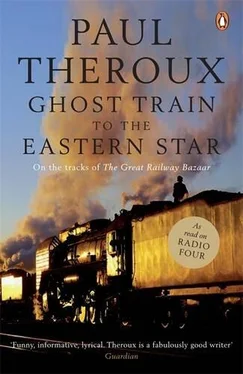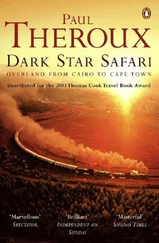The appeal of traveling through this wintry scene, just a few people on the train, the flat open land — What do they grow here? I wondered — the pleasure of it was its stark and rather romantic ugliness, and the knowledge that I was just passing through. I'd be in Budapest in a few hours, Bucharest tomorrow, Istanbul the next day. This sort of travel, an exercise in sheer idleness, was also a way of wallowing in the freedom of this trip.
Thirty-three years before, I had been anxious. Where was I going? What would I do with the experience of travel? I was oppressed by the sense that the people I loved most disapproved of my going. You're abandoning us! I don't want you to go. You'll be sorry!
In that mood of reproach, feeling scolded, I had looked out the window of a slightly different route — Yugoslavia — and hated what I saw, feeling futile among the muddy hills and resenting every obstacle, as though the trip I'd chosen to take was just an elaborate encumbrance. But I was happy now, and happiness lends, if not enchantment, then a merciful detachment. I did not see the route I was traveling as enemy territory. It looked disheveled and mild and a bit forlorn, but I didn't take it personally.
The lesson in my Tao of Travel was that if one is loved and feels free and has gotten to know the world somewhat, travel is simpler and happier. I thought that anyone who has lived through the latter half of the twentieth century is unshockable, and so has a better time of it, with lower expectations, a contempt for political promises. After a certain age the traveler stops looking for another life and takes nothing for granted.
And this time my wife was on the phone. She had prevailed on me to bring a hand-held device that doubled as cell phone and Internet receiver. I had resisted. I had traveled for more than forty years without feeling the need to be in close touch. And I hated the sight of people using cell phones as much as I hated the sight of people eating and walking at the same time — the unembarrassed indulgence, making a private ceremony into a public act, almost as a boast, braying into the damned thing and to the world at large: Hey, honey, I'm on a train! Pretty soon I'm going to be in a tunnel!
I had forgotten I had the instrument. I switched it on and got a screen message, Welcome to Hungary, and soon after that it rang again.
"I miss you," my wife said. "But I want you to know that I'm on your side. I know you have to take this trip."
"How's the knitting?"
"I haven't started. I'm still looking over the patterns."
I found her procrastination oddly reassuring, and we talked a little more, she at home and I on a train, looking out at the snowy fields outside a city of factories and tenements called Tatabanya, less than an hour from Budapest.
***
THE SIGHT OF THE old pockmarked city of puddles, smutty under the snowmelt, Keleti Station looming like a Hungarian madhouse in the rain, the slushy streets and muddy sidewalks, defrosting and dripping after the long winter — all of it made me hopeful. I wasn't looking for glamour or a version of home, but rather something altogether different, as proof that I'd covered some distance. Grim-faced women in old clothes, carrying shopping bags, scuffing through the slush in dirty boots, held out signs lettered Zimmer, offering their houses or apartments for home stays, to make a little money in an economy that had tanked so badly that people were leaving in droves — mobbing Keleti Station for the trains going west to Austria and Germany and Britain. I was crowded by taxi touts and pimps, not pestiferous but merely desperate for money.
I dumped my bag at Left Luggage — my train to Romania was not due to leave until late that evening — and walked out to look at the grandiose edifice of the station, with its statues and winged chariot, stallions and feather-and-floral motifs, dated 1884, an Austro-Hungarian extravaganza, grandiose and pompous, seeming to mock the weary travelers in wet raincoats and the footsore pedestrians with shopping bags.
"How's business?" I asked a woman at a bookstore.
"Is bad," she said.
I kept on asking as I strolled from the station, through the city to the Danube, for the pleasure of taking it all in, with the confidence that in eight or nine hours I would be back at the station to claim my bag and board a new train for Bucharest, the continuation of my own Orient Express.
It was about this time in my previous trip that I'd met the traveling companion I called Molesworth. He was a theatrical agent and bon vivant, unmarried, and his being a little fruity and familiar added to his twinkle. His clients had been some of the acting Cusacks and Warren Mitchell. A former officer in the Indian army, he had traveled widely in Asia. He winked into a monocle when he read a menu, and had a gentle habit of calling every man "George," as when speaking to the Turkish conductor: "George, this train has seen its better days." After my book came out, he said people recognized him in the text, even through a pseudonym. I saw him now and then in London and invited him to parties, where he made himself popular with his theater stories, all about luvvies, and afterwards my friends would say, "Terry is splendid." Before he died, he said the trip in 1973 to Istanbul was one of the best he'd ever made, and often added, "You should have mentioned my name." But his real name was too good to be true: Terrance Plunkett-Greene.
I trudged through the downpour with all the other trudgers until I came to a plausible-looking hotel called the Nemzeti, and went in, just to get out of the rain.
The restaurant was empty except for two women, wearing leather coats and smoking.
Wasn't I hungry? the pale waiter asked me. Wouldn't I be happier sitting in the warm restaurant and having the lunch of the day?
I agreed. Goulash was on the menu.
"Foreign people think goulash is stew. No. Goulash is soup."
"But what does the word mean?"
"I don't know in English. But a goulash is someone who looks after sheep."
"Red ink!" Plunkett-Greene would have said of the Hungarian wine. "Peasant fare! Beans!" he would have crowed over the food here at the Nemzeti.
The women left. A youngish man took their place. As he was the only other person in the restaurant, we fell into conversation. His name was Istvan. He was in Budapest on business. He said that some European companies were relocating to Hungary because of the cheap labor and the well-educated (but poverty-stricken) populace. I was to hear this description all the way through Asia, especially in India. His own business concerned small engines.
"How is the government here?"
"Terrible," Istvan said. He detested Hungarian politicians and their policies. "They are socialists. They are left. I am right."
This led to a discussion about the American government, which he also detested.
"Bush is dangerous, arrogant — not intelligent. And now we have to worry about what he'll do in Iran."
I should have guessed then that I was to hear this opinion in almost every casual conversation for the next seven months, whenever I revealed myself as an American: that our president was a moron and his policies were diabolical and he was controlled by dark forces. That America, for all its promise and prosperity, was the world's bully.
I would then say, as I did to Istvan, "Would you emigrate to the U.S. if you had a chance?" And they would say yes, as Istvan did, not because they had the slightest notion of American culture, politics, or history, but because they were passionate to get a job and make money, to own a car, a house, and flee their precarious hand-to-mouth existence to become Americans.
Istvan was fairly intelligent, but there were others, and the most unsettling thing was that the worst of them, the most brutish, would surprise me by praising the U.S. government for its militarism. I was somewhat apprehensive because I would be traveling through at least six Muslim countries. But all of them were tyrannies, more or less, and I took heart in knowing that when people are badly governed, they seldom hold you personally responsible for the decisions of your own government.
Читать дальше












